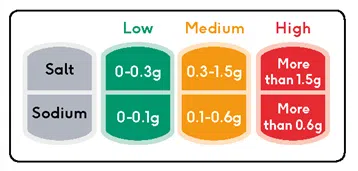Are you concerned about high blood pressure?
Hypertension, also called high blood pressure (HBP) is the third largest risk factor for all disease in the UK. It is estimated that one in every three adults in the UK has high blood pressure. Hypertension causes most problems when left untreated, but worryingly, 50% of people here with HBP are not even diagnosed let alone receiving treatment.1https://www.bloodpressureuk.org/news/media-centre/blood-pressure-facts-and-figures/ Taking action to lower your blood pressure will reduce your risk of heart attacks, strokes, and many other health problems.
But there is good news! If you want to reduce your high blood pressure naturally, you can do this fairly easily with a combination of dietary considerations and lifestyle changes.
1. Reduce Salt
Excess salt can lead to higher blood pressure, which also increase your risk of stroke and heart disease. Keep your salt intake below 6g per day (approx. 1 tsp).2https://www.nhs.uk/conditions/high-blood-pressure-hypertension/treatment/ It’s a common misconception that if you refrain from adding extra salt to your food, you’re not over-doing it. Unfortunately, it’s not that simple!
- We consume most of our salt from everyday foods like breakfast cereal, bread, and ready meals. Compare the nutrition labels on your foods and opt for the lower salt options. By checking labels on common household foods such as ketchup, cereals, or pasta sauces you can substantially reduce your salt intake. Challenge yourself to check two foods each week during your shopping, and swap for the option with lower salt content.3https://www.nhs.uk/live-well/eat-well/how-to-eat-a-balanced-diet/tips-for-a-lower-salt-diet/
- As a guideline, low salt is considered less than 0.3g salt (or 0.1g sodium) per 100g, and more than 1.5g salt (or 0.6g sodium) per 100g is a lot.4https://www.bda.uk.com/resource/hypertension-diet.html5https://www.nhs.uk/live-well/eat-well/food-guidelines-and-food-labels/how-to-read-food-labels/

- Get out of the habit of automatically adding salt to your meals – taste them first!6https://www.nhs.uk/live-well/eat-well/how-to-eat-a-balanced-diet/tips-for-a-lower-salt-diet/
- Be aware of your use of table sauces, they are often high in salt (i.e. soy sauce, mayonnaise, mustard, etc.)
- Use alternatives for flavouring your food when cooking. Black pepper, fresh herbs, spices, garlic, ginger, homemade stock, and gravy all add delicious flavour without extra salt!
- Opt to roast or bake vegetables to bring out their flavour.
2. Get Active
Regular exercise can reduce your risk of stroke, coronary artery disease, heart disease, and other major illnesses by up to 30%. Exercise is the magical cure we’ve always had – the preventative answer to so many common ailments!7https://www.nhs.uk/live-well/exercise/exercise-health-benefits/ The World Health Organisation suggests we each do 150 minutes of moderate-intensity exercise each week for good health, along with two sessions of strength training.8https://www.who.int/news-room/fact-sheets/detail/physical-activity The best kind of exercise is the kind that YOU will do! Any kind of exercise that gets your heart pumping has huge benefits for your health.
3. Reduce Alcohol Intake
Excess alcohol over time or high levels of alcohol on one occasion can cause damage to the heart. This can lead to high blood pressure, irregular heartbeat, stretching of the heart muscle, and elevated risk of stroke. High blood pressure is the most common, and preventable problem related to alcohol.9https://www2.hse.ie/wellbeing/alcohol/physical-health/alcohols-effect-on-the-body/blood-pressure-and-the-heart.html Reduce alcohol consumption with the following tips:
- Keeping track of your alcohol consumption in a drinks diary can help keep you accountable and highlight any excess levels of alcohol.
- Even one drink a day can raise risk of high blood pressure.10https://www2.hse.ie/wellbeing/alcohol/physical-health/alcohols-effect-on-the-body/blood-pressure-and-the-heart.html Have several alcohol-free days throughout the week. The more you can cut down (e.g. taking several week breaks) the better for your health and heart.
- Stay hydrated before, during, and after drinking alcohol. Alternate between alcoholic and non-alcoholic drinks when you’re out.
- Ask your friends and family for support. Letting those closest to you know you are taking steps towards better health and want their support, will make cutting down easier.
4. Eat for Good Health
Maintain a low-fat, balanced, gut-healthy diet, including lots of fresh plant foods – think vegetables, fruit, wholegrains, nuts and seeds, legumes, and pulses. Unfortunately, most adults in the UK consume excessive calories through food and drinks, too much saturated fat, salt, and sugar, and insufficient fibre, fruits, vegetables, or oily fish.11https://www.nhs.uk/live-well/eat-well/how-to-eat-a-balanced-diet/eating-a-balanced-diet/
- Ensure to eat a wide variety of different foods, aiming for a minimum of 30 different plant foods each week.
- The World Health Organisation recommends 30 g of fibre per day, but the average UK adult is eating less than half of this. Good sources of fibre include oats, pulses, lentils, chickpeas, quinoa, peas, and Complete Prebiotic.
- Introduce Kefir as part of your daily morning routine – Studies have shown that supplementing with a probiotic can significantly reduce blood pressure.12https://www.healthline.com/nutrition/supplements-lower-blood-pressure
- Keeping your intake of saturated fats low will aid in keeping your cholesterol at healthy levels, and thus reduce your risk of developing heart disease.13https://www.nhs.uk/live-well/eat-well/how-to-eat-a-balanced-diet/eating-a-balanced-diet/
5. Maintain a Healthy Weight
Choosing whole foods, low saturated fat options, and avoiding processed foods will also aid in losing weight or maintaining a healthy weight, which is important for reducing high blood pressure. This is particularly important for overweight or obese individuals. As your body weight increases, so does your blood pressure. For people who are already overweight with high blood pressure, losing weight has the most significant effect.14https://www.nhlbi.nih.gov/files/docs/public/heart/hbp_low.pdf If you are trying to lose weight, focus on reducing your calorie intake and increasing your daily activity levels.
6. Quit Smoking
Smoking puts you at a much greater risk of stroke and heart attack.15https://www.nhs.uk/conditions/high-blood-pressure-hypertension/prevention/ In the short term, smoking a cigarette will instantaneously increase your blood pressure. These repeated blood pressure spikes may cause damage to your artery walls. Smoking can also lead to a build-up of plaque inside your arteries, which can lead to stroke or heart attack if left untreated.16https://www.healthline.com/health/high-blood-pressure-hypertension/smoking-and-hypertension Quit Smoking to prevent this damaging and narrowing of your arteries. Furthermore, both high blood pressure and smoking have this effect of narrowing your arteries. So, if you smoke whilst having high blood pressure, you are at a much-heightened risk of heart or lung disease.17https://www.nhs.uk/conditions/high-blood-pressure-hypertension/prevention/
7. Manage Stress
Manage your stress levels by getting sufficient sleep, asking for help when needed, and implementing relaxation techniques. Feeling stressed at times is normal, and will only raise your blood pressure in the short term. However, feelings of stress or ongoing stress tend to lead to blood pressure increasing behaviours – overeating, bad food choices, drinking alcohol, and reduced activity.18https://www.bda.uk.com/resource/hypertension-diet.html Chronic emotional stress may also contribute to hypertension.19https://www.mayoclinic.org/diseases-conditions/high-blood-pressure/in-depth/high-blood-pressure/art-20046974 Try to identify your personal stressors so that you can avoid triggers. Make time to relax each day with stress-relieving practices such as exercise, yoga, meditation, deep breathing, and spending time in nature.
8. Caffeine Intake
Consider limiting caffeine if you drink a lot of it. Drinking 4+ coffees a day may increase your blood pressure. If you’re trying to reduce or prevent hypertension, consider cutting down on coffee, tea, and caffeine-containing energy drinks.20https://www.nhs.uk/conditions/high-blood-pressure-hypertension/prevention/ However, this is not at the top of the priority list of lifestyle changes, as research suggests that coffee only causes a short term raise in blood pressure (up to 3 hours). This occurs in non-regular coffee drinkers, in frequent coffee consumers this effect is actually diminished.21https://www.healthline.com/nutrition/coffee-and-blood-pressure#short-term-effect More research is needed to confirm long-term health effects of drinking coffee, some studies even suggest the health benefits (e.g. strong antioxidant effect) outweigh the negative effects.22https://www.healthline.com/nutrition/coffee-and-blood-pressure#short-term-effect
Simple lifestyle changes are a great way to reduce your high blood pressure, or to increase your protection against developing high blood pressure. Get your blood pressure checked regularly, especially if you are over the age of 35. Hypertension causes most problems when left untreated! If you are working with this condition, we suggest that you check with your GP before implementing any new protocols.
For more information, check out our article “9 Things You Can Add to Your Diet to Reduce High Blood Pressure” to learn about foods and supplements that can help!
References
- 1
- 2
- 3
- 4
- 5
- 6
- 7
- 8
- 9
- 10
- 11
- 12
- 13
- 14
- 15
- 16
- 17
- 18
- 19
- 20
- 21
- 22














